Greenpeace to new Plastics Treaty talks Chair: Restore trust, transparency and ambition
Greenpeace International
Geneva, Switzerland – Following the election of HE Ambassador Julio Cordano of Chile as the new Chair of the committee tasked with negotiating a global plastics treaty, Greenpeace International said the appointment must mark a turning point for the Global Plastics Treaty talks and the start of a renewed effort to rebuild trust in the process. The election took place today during the third installment of the Intergovernmental Negotiating Committee’s (INC) fifth meeting (INC5.3). Graham Forbes, Greenpeace Head of Delegation to the Global Plastics Treaty negotiations and Global Plastics Campaign Lead for Greenpeace USA, said: “Ambassador Cordano inherits a treaty negotiation process under strain. We have lost precious time since the negotiations began while the plastics crisis worsens by the day. We urge the new chair to rally world leaders to deliver a strong and effective agreement that puts people and the planet first. No more excuses. This is a once-in-a-generation opportunity to protect human health, our climate system and global biodiversity from toxic pollution, and initiate a new era of global innovation. “Around the world, billionaires and corporate interests are challenging democratic institutions and undermining global cooperation. Effective multilateralism is a necessary condition of human survival. It is time for governments that understand this to step up to the challenge and deliver the Global Plastics Treaty that justice and science demand.” ENDS Photos are available in the Greenpeace Media Library. Contacts: Angelica Carballo Pago, Global Plastics Communication and Media Lead, Greenpeace USA, apago@greenpeace.org, +63917 1124492 Greenpeace International Press Desk, +31 (0) 20 718 2470 (available 24 hours), pressdesk.int@greenpeace.org (299 mots)
Greenpeace Pictures of the Week
Greenpeace International
Jane Fonda at a Greenpeace Premiere in the US, the OILympics in Milan, and protests against Shell and ICE, here is some of Greenpeace’s work from around the world this week. United States – GASLIT, Greenpeace USA’s first feature film featuring Academy Award-winning actor and activist Jane Fonda, premieres at the 41st Santa Barbara International Film Festival on 5 February 2026. Directed by Katie Camosy, GASLIT is both a call to action and a reflection on the decades-long struggle between fossil fuel profiteering and the survival of frontline communities. Camosy and Fonda were joined at the premiere by film participants and Texas/Gulf Coast community advocates Jenny Espino and Diane Wilson, as well as award-winning actor Connie Britton. Italy- Hard-hitting video highlighting the absurdity of Italian oil and gas giant Eni’s sponsorship of the Milano Cortina Winter Olympic Games, as one of the corporations stealing our winters through its planet-heating pollution. This satirical video, created by Studio Birthplace, shows speed skaters, skiers and bobsledders racing along, with Eni logos prominent. Suddenly a trickle of oil turns into a tsunami, sweeping the athletes off their feet, causing them to slip and crash as a sea of oil washes over them. One year of Eni’s emissions could melt enough glacier ice to fill 2.5 million Olympic swimming pools, demonstrating the corporation’s central role in the climate crisis that threatens the future viability of the Games and winter sports. Canada – Greenpeace activists unveiled a banner saying “No Canadian Arms for ICE” at the Brampton headquarters of the Canadian company that is building armoured vehicles for the U.S. Immigration and Customs Enforcement (ICE), as they called on all federal Members of Parliament to support the legislation before Parliament that would tighten restrictions on arms exports. Italy – Greenpeace Italy activists took action in front of Milan’s Duomo to protest ENI, a major partner of the Milan-Cortina Olympic Games. Its uncontrolled emissions are fueling the climate crisis, threatening the survival of glaciers and snowpack, and thus the Winter Olympics themselves. Activists placed an artifact depicting the Olympic rings soaked in oil, illustrating how polluting companies are also polluting the Olympic Games with their greenwashing. United Kingdom – Greenpeace UK activists stage a protest outside Shell’s London HQ, holding giant figures comparing Shell’s annual profit with the UK’s 2025 bill for damages caused by extreme weather following the oil giant’s profit announcement. United Kingdom – Greenpeace activists take over a billboard in London in solidarity with American citizens impacted by ICE, drawing the parallel to the climate crisis; as the climate breakdown is already the leading driver of migration worldwide. Greenpeace has been a pioneer of photo activism for more than 50 years, and remains committed to bearing witness and exposing environmental injustice through the images we capture. To see more Greenpeace photos and videos, visit our Media Library. Texte intégral (1410 mots)


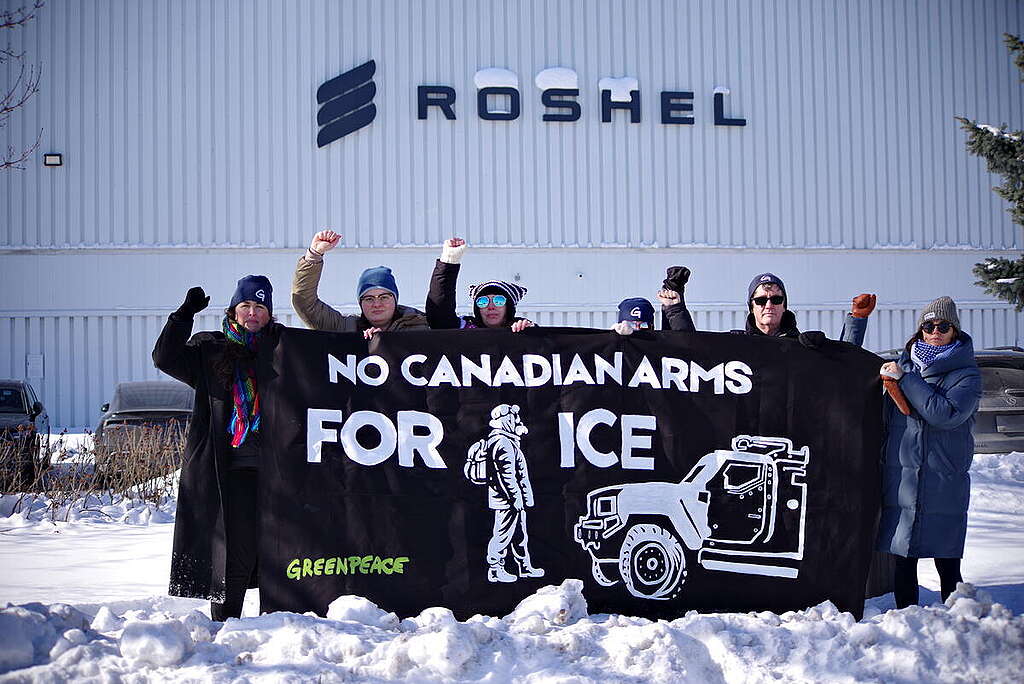
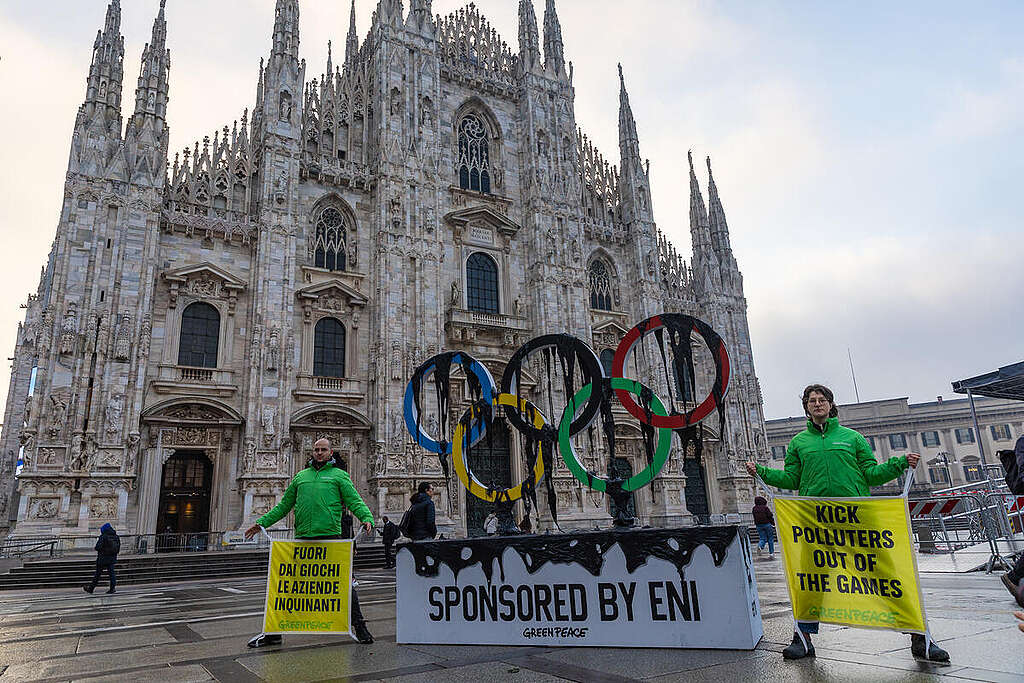
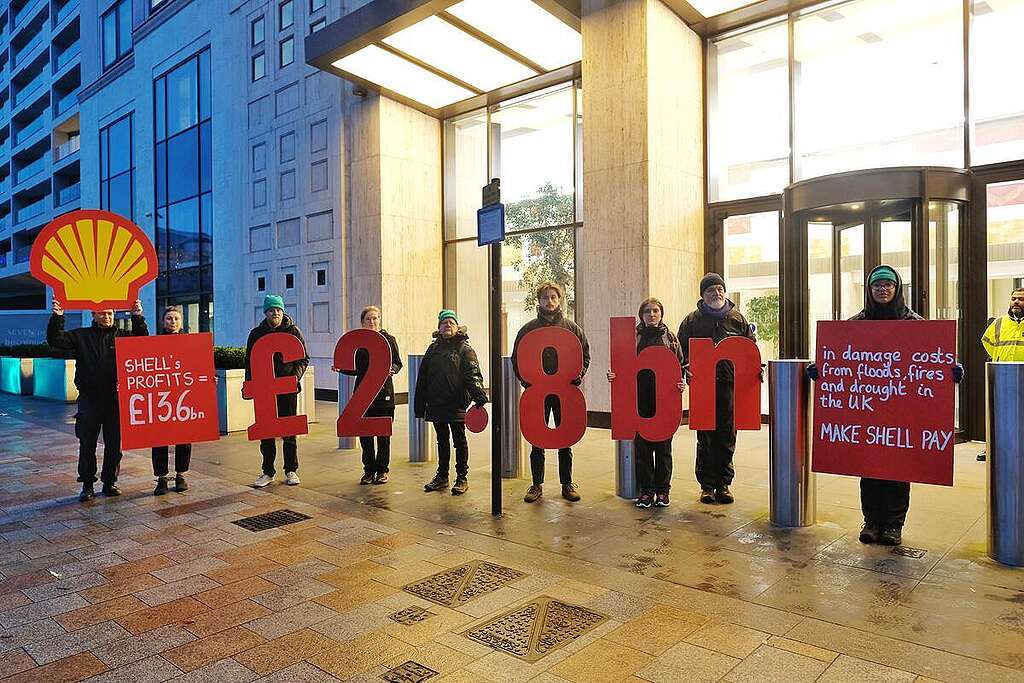
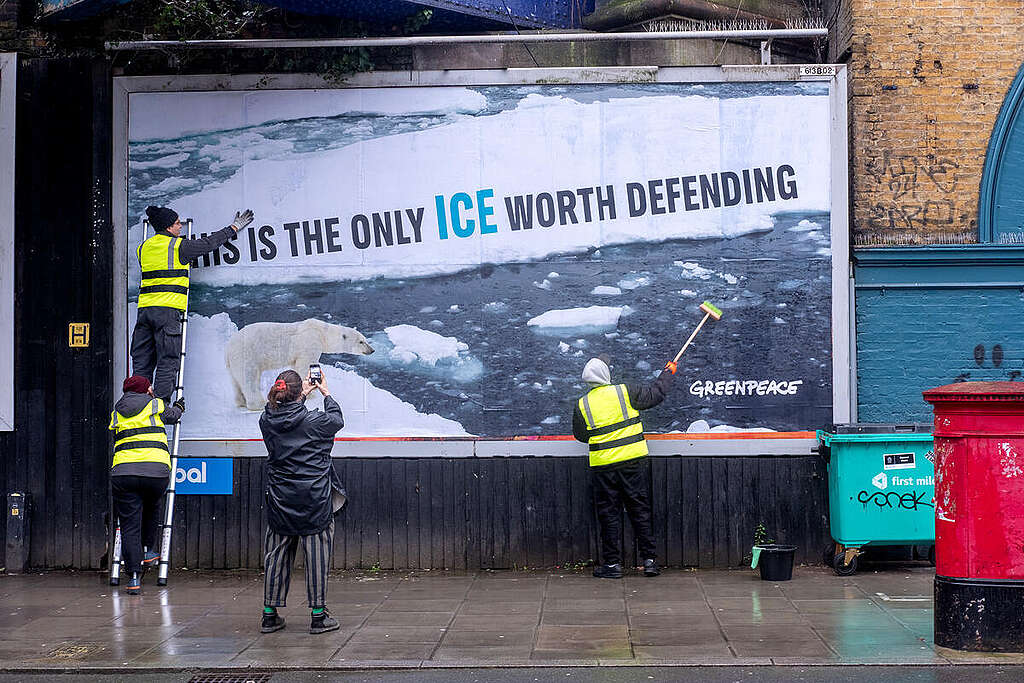
The UN Tax Convention could be a game-changer. So why is ambition still stuck in first gear?
Clara Thompson
If you’ve been following global climate and finance politics lately, you’ll have noticed a strange contradiction. On the one hand, governments keep telling us we need more climate finance, fairer taxation, and new public resources to deal with climate breakdown, inequality and crumbling public services. On the other hand, when it comes to the one global forum designed to actually fix international tax rules – the UN Tax Convention – that bold ambition doesn’t translate. These negotiations, currently underway in New York, present a unique chance to hold corporate tax avoiders and polluters accountable, unlocking trillions in public funds for climate action, nature protection, and vital public services. Instead of rising to that moment, however, the process risks failing to deliver the transformative change many countries are calling for. Same governments. Same problems. Very different energy. So what’s going on? The latest draft of the UN Tax Convention includes articles on sustainable development and taxing high-net-worth individuals (HNWI). That’s good news. A few years ago, neither would even have made it into the room. But here’s the catch: they’re still written mostly as ‘principles’, not commitments. The sustainable development article remains declaratory. It acknowledges that tax cooperation should support social, economic and environmental goals, without spelling out how, or what kinds of mechanisms would be needed to deliver them. No change to this article since the Terms of Reference were set out. The article on high-net-worth individuals has improved on paper (it uses ‘shall’ instead of ‘agree’ now), but still stops short of what’s actually needed to tax extreme wealth effectively and fairly. In short: governments agree that something should happen, but appear reluctant when it comes to the details of how to actually make it happen. That’s like agreeing to catch smugglers, but banning customs from opening the luggage. This is where things get awkward. In other international forums (COP30, G20, FfD4 to name a few examples), many of the same governments are already making much bolder statements. For example: In 2025, at the Fourth International Conference on Financing for Development (FfD4) in Seville, Spain, governments committed to improving tax cooperation and transparency, explicitly referencing progressive taxation to fund social protection and integrate undeclared wealth, and in written submissions, countries such as Brazil, Colombia, Germany, France, Spain and Sierra Leone have explicitly supported stronger cooperation on HNWI taxation in the UN process. Many African countries, including Zambia and Nigeria, have repeatedly highlighted in their plenary interventions how our broken global tax system undermines development and climate action. Since the UN Tax Convention negotiations began in 2025, at least 17 countries have made supportive statements for more detail to be added on the issue of sustainable development, several of whom have explicitly endorsed inclusion of environmental taxation and the polluter pays principle. And yet, when negotiations move from statements to drafting, ambition narrows. Not all elements raised in countries’ submissions find their way into the Chair’s text, and several governments continue to defer to high-level, non-committal language. Political choices are reframed as technical questions by some countries, while the potential of the Convention to support climate action and sustainable development through tax policy remains underexplored. Issues with clear distributional complexities are quietly treated as beyond the Convention’s scope. Whenever ambition stalls, one word inevitably appears: sovereignty. We’re told that taxing the super-rich is a domestic issue. That coordinated standards on taxing polluters would infringe national autonomy. That global rules somehow threaten democratic choice. But here’s the inconvenient truth: there is nothing sovereign about a tax system you can’t enforce. Here’s the problem: in today’s world, money, profits, and assets move faster than national laws, often through loopholes and tax havens, and across borders, while information about these assets does not. Countries trying to take action alone end up competing with each other, lowering standards, and losing billions in the process. These are funds that could have supported climate finance and sustainable development. Real sovereignty isn’t the right to say “no” alone. It’s the ability to withstand pressure together to enforce rules that protect public resources and the planet. This is why we need global tax reform. We’re living through a rupture, not a transition. The old era of club-based tax governance (dominated by a handful of rich OECD countries) is cracking under its own contradictions. At the same time, multilateralism itself is under attack, with institutional deadlock and unilateral action increasingly replacing cooperation, from the UN Security Council to climate negotiations. That’s precisely why the UN Tax Convention matters. It’s the only forum in international tax governance where every country has a seat, decisions aren’t hostage to unanimity, and tax cooperation can be anchored in sustainable development, not just capital mobility. In short: it’s the one place where we can move from fair taxation by permission to fair taxation by right. Hey reader, if you’ve reached this point it means this is a topic you’re really interested in, and we would like to know who you are, so please leave a comment below and share your thoughts! If the Convention is to live up to its mandate, four things need to happen: The tools exist. The political arguments are already being made elsewhere. And the costs of inaction are painfully visible. What’s missing isn’t expertise – it’s alignment. If governments are serious about climate justice, social cohesion and sustainable development, the UN Tax Convention is not the place to be cautious. It’s the place to be honest. Because in a world where crises are global and wealth is mobile, collective action isn’t a loss of sovereignty – it’s the only way to reclaim it. And yes, taxing the super-rich and corporate polluters is part of that story. Together, let’s urge governments to tax the super-rich and fund a green and fair future. Clara Thompson is the Global Tax Justice Lead at Greenpeace International. She is currently in New York City for the 4th round of negotiations of the United Nations Treaty on International Tax Cooperation (also known as the UN Tax Convention). Texte intégral (2501 mots)
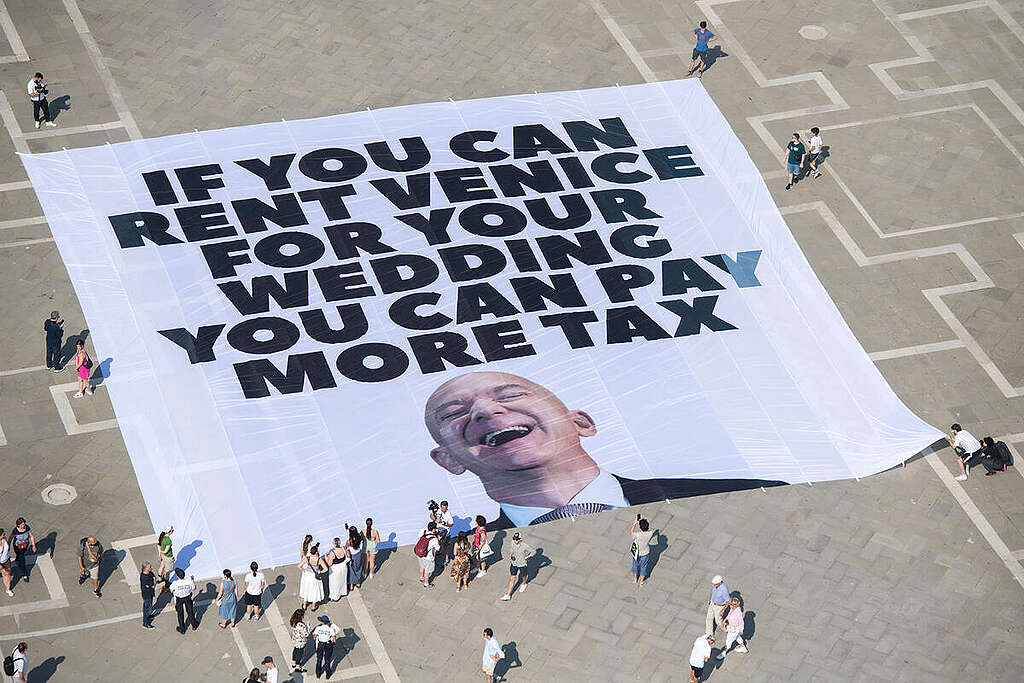
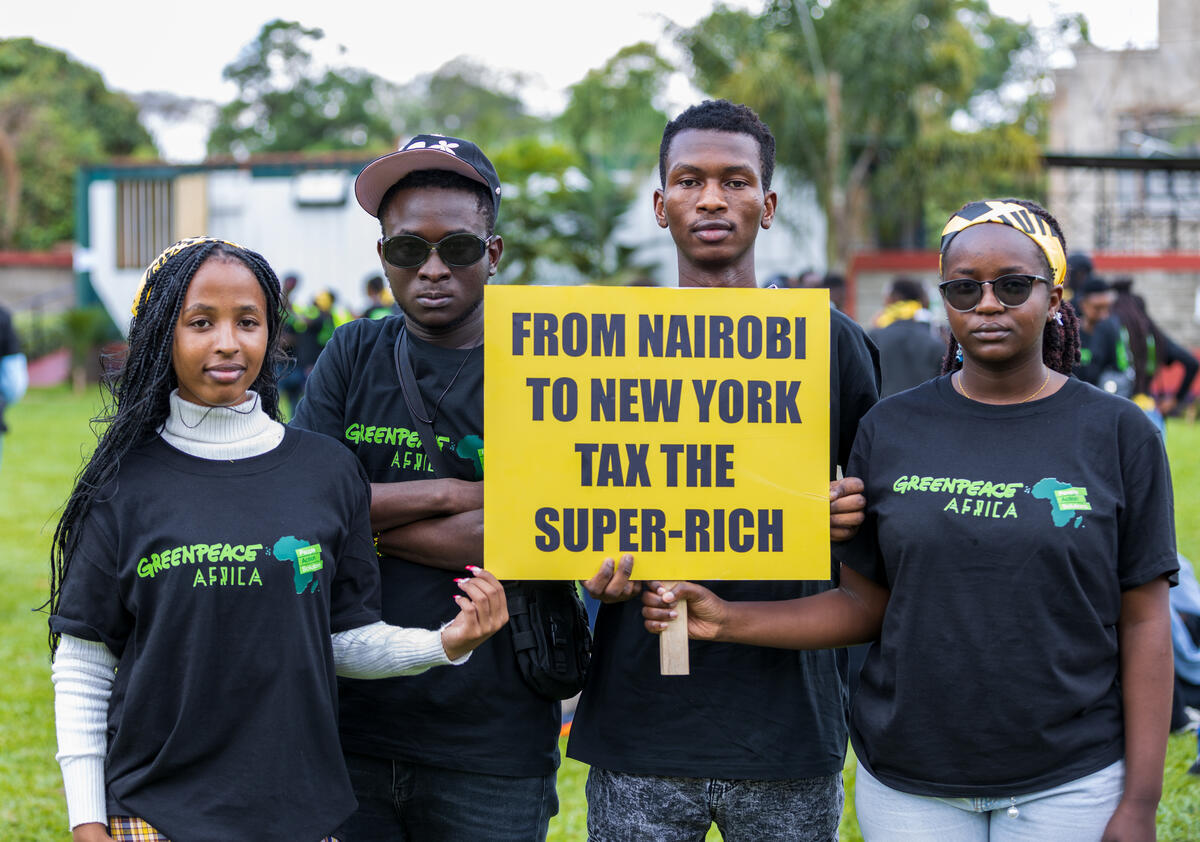
Principles everywhere, commitments nowhere
The paradox no one wants to name
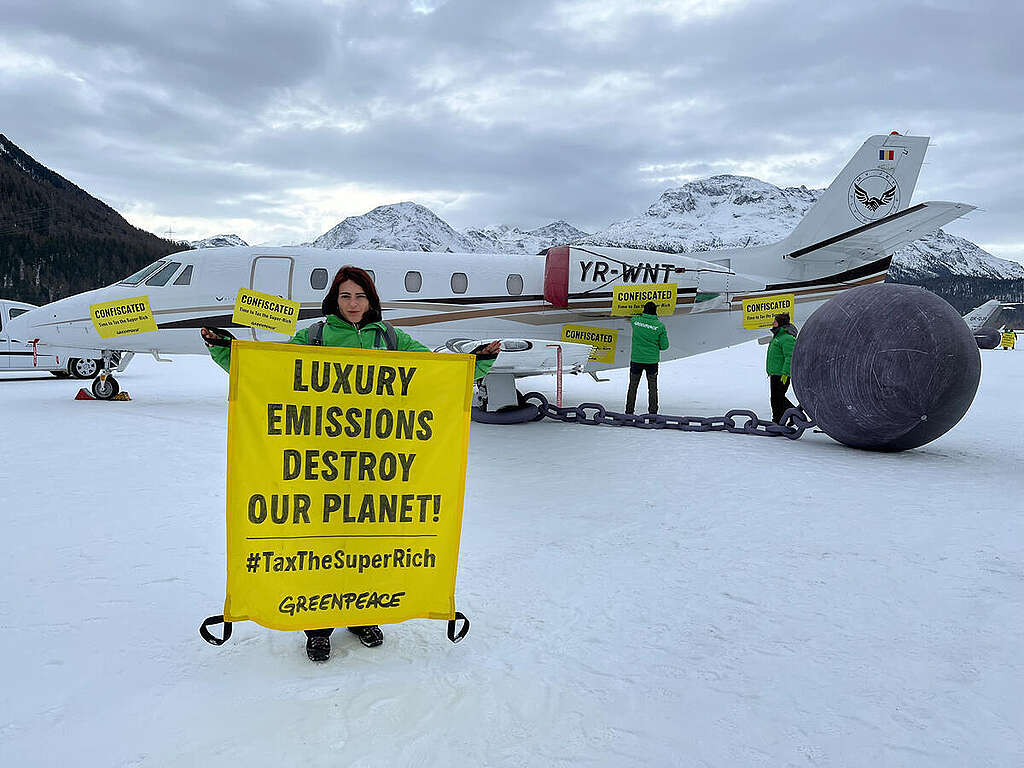
Sovereignty: the most misused word in the room
Why the UN Tax Convention matters more than ever
What needs to change
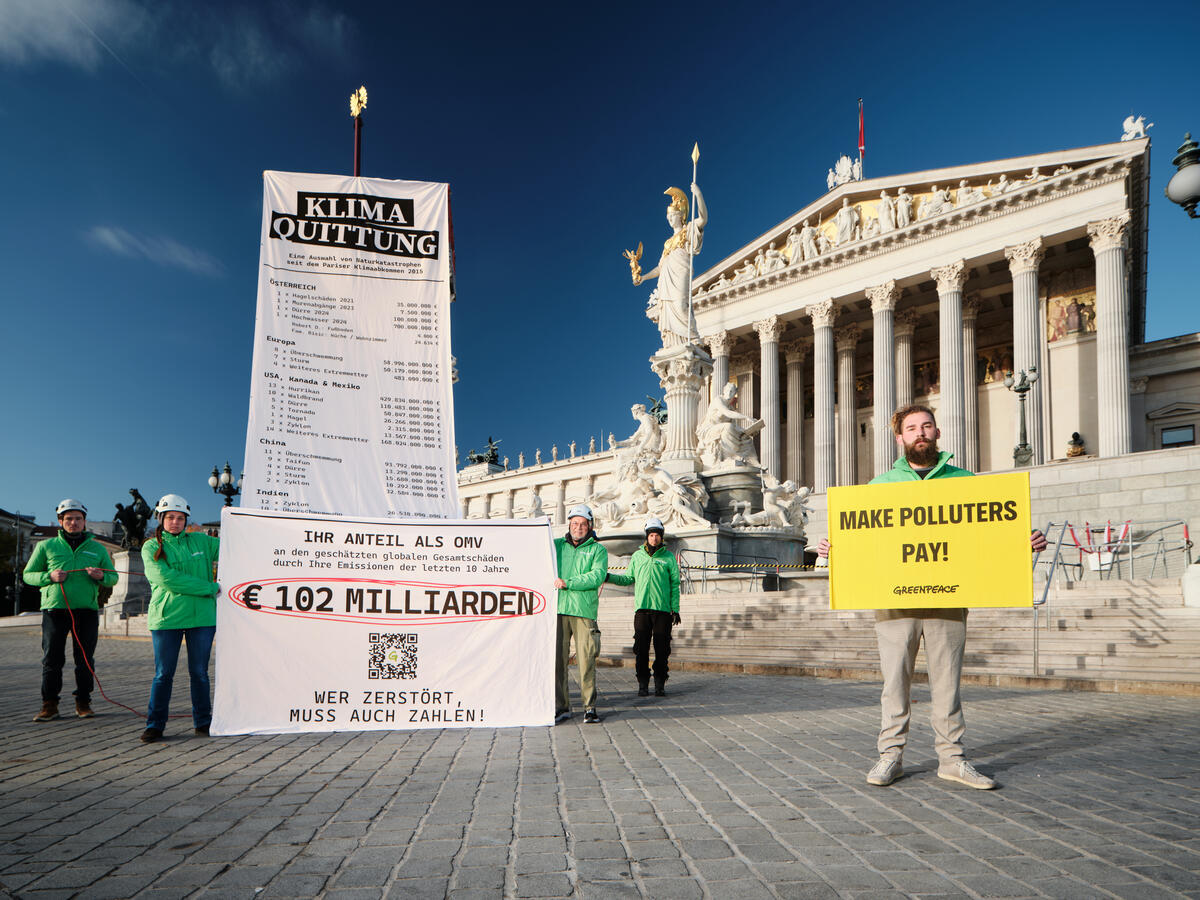
The moment we stop pretending

Greenpeace Italy unveils Olympic rings leaking oil in Milan to call out fossil fuel sponsorship of Winter Games
Greenpeace International
Milan, Italy – This morning, Greenpeace Italy activists placed a large installation depicting the Olympic Rings dripping oil and the words “Sponsored by Eni” in Piazza Duomo in Milan, where the Olympic flame is expected to arrive today. Activists displayed banners reading “Kick polluters out of the Games”, in a protest against one of the Games’ major sponsors, Italian oil and gas giant Eni, whose greenhouse gas emissions threaten winters as they are currently known and the Winter Olympics and Paralympics themselves. Photos and videos of the Greenpeace Italy protest can be downloaded via the Greenpeace Media Library Greenpeace Italy climate campaigner Federico Spadini said, “It’s absurd that the Olympics and Paralympics are partnering with corporations whose emissions threaten the ice and snow that winter sports depend on. Oil and gas companies like Eni are driving the climate crisis, and it is unacceptable that its greenwashing operations have been allowed to tarnish the Olympic values of respect for people and the environment. That’s why Greenpeace is calling for the International Olympic Committee to drop oil and gas sponsorship from the Winter Olympic and Paralympic Games and commit to ending fossil fuel sponsorship across all Olympic Games.” According to recent analysis based on scientific modelling, Eni’s annual emissions could melt enough glacier ice to fill 2.5 million Olympic swimming pools.[1] In recent days, Greenpeace Italy and Greenpeace International sent an open letter to the International Olympic Committee (IOC) asking it to ban fossil fuel sponsorships, building on its legacy of banning tobacco advertising in 1988.[2] Greenpeace Italy has also released a video denouncing Eni’s impact on the Winter Games, featuring the same image of the Olympic Rings dripping oil, as that used in the Milan installation. ENDS Photos and videos of the Olympics Rings installation in Milan can be downloaded via the Greenpeace Media Library Notes: [1] https://www.nature.com/articles/s41558-018-0093-1 [2] The open letter to the International Olympic Committee Watch Greenpeace Italy’s Oilympics video here Contacts: Gaia Maione, Press Office Greenpeace Italy, +39 340 571 8019, gmaione@greenpeace.org Martin Zavan, Communications Specialist, Greenpeace International, +61 424 295 422, mzavan@greenpeace.org Greenpeace International Press Desk: +31 (0)20 718 2470 (available 24 hours), pressdesk.int@greenpeace.org Texte intégral (555 mots)
An oil and gas corporation killing winters with its planet-heating pollution is sponsoring the Winter Olympics. Could it be Eni more ironic?
Federico Spadini
We all want a world where winters remain a source of joy. A world where professional athletes and amateurs alike can count on snow and ice to pursue their passions, where children can play in the snow, and where iconic, international sporting events, like the Winter Olympics and Paralympics, continue to take place and inspire people. But the snowy scenes that provided a backdrop to so many of cherished childhood memories in Italy are under threat. The Games require the right set of conditions for competition to be safe and fair, and those very conditions are under threat from fossil fuel corporations, such as Italian oil and gas giant Eni, and their planet-heating operations. Now, in the days leading up to the 2026 Winter Olympics Milano Cortina, Greenpeace Italy has released a hard-hitting video that aims to cut through the noise and expose the threat that fossil fuels and the Games major sponsor, Eni, in particular, pose to the future of the Winter Olympics and Paralympics. The ‘Oilympics’ film shines a spotlight on Eni’s role in fuelling the climate crisis while highlighting our demand that the International Olympic Committee (IOC) ban all fossil fuel advertising and sponsorship, in order to protect the future of winter sports, and stop polluters from hijacking the Olympic spirit. Fossil fuel companies are greenwashing their image by sponsoring big sporting events to hide their destruction. Don’t let them get away with it. The short film exposes the irony of a company that is melting winter, sponsoring the Winter Games. Oil and gas corporations are driving the climate crisis, and at this rate by the 2080s over half of suitable locations will be unable to host the Winter Olympics. And Eni’s planet-heating pollution has a central role in this dour forecast. One year of Eni’s fossil fuel emissions could melt enough glacier ice to fill 2.5 million Olympic swimming pools. But the impacts go much further. Eni is currently suing Greenpeace Italy because it stated Eni harms people, after Greenpeace Netherlands calculated that Eni’s self-reported 2022 emissions could cause 27,000 excess deaths due to increased temperature alone before the end of the century. This was published in a 2023 study by Greenpeace Netherlands based on a peer-reviewed methodology. Given all of that, it’s no surprise that Eni actively seeks to hide these truths from the public, reportedly spending tens of millions of dollars on sporting sponsorships to soften its image. Buying an artificial association with the 2026 Winter Olympics in Milan and Cortina is part of that deceptive and cynical greenwashing strategy. Fossil fuel corporations, like Eni, should pay for the damage they cause, not buy reputational cover by associating themselves with Olympic values of excellence, respect, and friendship. Greenpeace supporters, nature lovers and the winter sports community are united in our desire to protect the Winter Olympics and Paralympics for present and future generations. The Olympic values of respect for people and the environment matter. Allowing Eni to use the Games as a billboard for greenwashing undermines those values and threatens the future of the event the IOC claims to support. Eni and the fossil fuel industry are driving climate change, which is jeopardising mountain communities already struggling with a rapidly changing climate, the livelihoods of many people who rely on cold winters, and the 60 million Europeans who ski every year. A better future is still within reach. The International Olympic Committee (IOC) can help lead the shift away from fossil fuels by refusing to be complicit in the deceptive practices of corporations like Eni who are stealing the winters that form the backdrop to so many precious childhood memories. This has happened before with tobacco advertising. Once the scientific consensus on the harms of smoking became too strong to ignore, the IOC banned tobacco advertising ahead of the 1988 Winter Olympics in Calgary. It played a key role in denormalising cigarette advertisements and set a strong precedent that was followed by sporting bodies and other event organisers around the world. It serves as a powerful testament to the power of the IOC to help shape policy at a global level and it shows that the same can be done with fossil fuel sponsorship and advertising. When iconic and influential sporting and cultural organisations like the Olympics choose integrity over greenwashing, they revoke polluters’ license to mislead and force them to face the harms they cause. That’s why Greenpeace is taking on fossil fuel corporations like Eni that are stealing our winters by shrinking snow seasons, collapsing glaciers and threatening the sports and traditions that millions of people cherish. Greenpeace is calling for the IOC to drop oil and gas sponsorship from the Winter Olympic and Paralympic Games, and commit to ending fossil fuel sponsorship across all Olympic Games. It benefits no one but oil and gas corporations; it distracts everyone from the environmental destruction they cause and the communities they harm and helps them avoid accountability. Fossil fuel companies are greenwashing their image by sponsoring big sporting events to hide their destruction. Don’t let them get away with it. Eni should be paying for the damage they have caused, not using sponsorships to polish their image while driving the climate crisis that threatens the future of winter sport. A future of icy cold winters with dependable snow is still possible, but like a glacier in the climate crisis, it’s melting before our eyes. Protecting the climate requires us to take on the forces that are destroying our winters and everything we love about them. That future is still possible if we change course now. Federico Spadini is a Greenpeace Italy Campaigner based in Milan, Italy. Texte intégral (2088 mots)
Oilympics: calling out Eni’s greenwashing

Who really pays for Eni’s greenwashing?
How do we stop oil corporations like Eni?

The climate crisis and the future of the Winter Olympics
Sophie Allain
More than half of the potential host cities Winter Games will be “climate-unreliable” by the 2080s! That’s the verdict of a rigorous 2024 scientific study funded by the International Olympic Committee (IOC) itself, confirming the importance of reducing greenhouse gas emissions. Experts Robert Steiger and Daniel Scott examined three different emissions scenarios and analysed the impacts on the weather in cities that could potentially host the Winter Olympics. They looked at the temperature and depth of snow. The results serve as a stark warning. Under the mid-range emission scenario (which is considered the most likely scenario), only 46 out of the 93 locations they looked into will be “climate reliable”. This means that there are far fewer places in the future where athletes could compete safely and fairly. This does not come as a surprise – in an earlier study the same researchers found that among 21 previous host cities, only one is projected to be reliable by the end of the century if global emissions remain on the trajectory of the past two decades. But this is not solely a problem for the future. In 2022, the Beijing Winter Olympics set a precedent as the first games to use 100% artificial snow. And the impacts of climate change on winter sports are not limited to the Olympics. The 2022/2023 Ski World Cup season started with warm weather and lack of snow, resulting in the International Ski Federation (FIS) cancelling or postponing seven out of first eight scheduled races. These incidents, plus a lack of snow for practice sessions, more injuries and reduced climate reliability of host cities, led over 500 athletes to sign an open letter demanding the FIS take greater climate action, with Greenpeace International lending support. This led the FIS to implement a series of reforms on Winter Olympic viability, nonetheless, the impact of fossil fuels remains. In a participant perspective survey involving around 400 Winter Olympic athletes, over 95% stated that climate change is/will negatively impact their sport, and winter sport culture in general by reducing training opportunities for the next-generation. Fossil fuel corporations use sports sponsorships to “polish” their image. They want us to see their logo next to world-class athletes to distract from how their business is driving the climate crisis that threatens those very sports. One such corporation is the Italian oil and gas giant, Eni, which is sponsoring the 2026 Winter Olympics and Paralympics in Milano and Cortina. That’s right, a company that is driving the climate crisis and putting winter sports at risk is using the Games to distract the public from its destructive impact. And much like the climate, the battle is heating up. Eni is currently in a legal battle with Greenpeace Italy. In 2023, Greenpeace Netherlands released a study applying the Mortality Cost of Carbon method, which projected that Eni’s self-reported emissions for 2022 alone could cause 27,000 temperature-related excess deaths by the end of the century. Instead of changing their business, Eni attempted to silence these legitimate criticisms by suing Greenpeace Italy. Lawyers call this a SLAPP (Strategic Lawsuit Against Public Participation) but in layman’s terms this is legal bullying and intimidation. To better understand the impact Eni’s emissions could have on ice, take a look at Eni’s own company reports. In 2024, Eni reported NET Greenhouse Gas lifecycle emissions of 395 million metric tonnes CO2e. Attribution science is becoming more and more accurate at estimating likely future harms from today’s carbon emissions. The shrinking of glaciers, for example, is widely accepted as evidence of climate change. Glacier mass loss has been reported to be related to temperature increase, which is known to have a direct relationship with cumulative carbon emissions. Scientific modelling shows that for every 1 kg of CO2 we put into the air, we eventually lose about 15.8 kg (5.9–20.5 kg) of glacier ice. When you apply that maths to the equivalent of Eni’s 2024 emissions, we are looking at a potential committed loss of 6.2 (2.3–8.1) billion tonnes of glacier ice over time. That’s a huge number, so let’s break it down into something we can see: Olympic-sized swimming pools. Imagine two and a half million swimming pools lined up – that’s the equivalent to the projected impact of one year of one company’s emissions. If these estimates shock you, you aren’t alone. We need to protect the future of winter sports by holding polluters accountable. Fossil fuel companies should be paying for the damage they cause through taxes and fines, not using our favorite sports to hide their impact. That’s why Greenpeace is calling for the International Olympic Committee (IOC) to drop oil and gas sponsorship from the Winter Olympic and Paralympic Games – and commit to ending fossil fuel sponsorship across all Olympic Games. Fossil fuel companies are greenwashing their image by sponsoring big sporting events to hide their destruction. Don’t let them get away with it. This has happened before with tobacco advertising. Once the scientific consensus on the harms of smoking became too strong to ignore, the IOC banned tobacco advertising ahead of the 1988 Winter Olympics in Calgary. It played a key role in denormalising cigarette advertisements and set a strong precedent that was followed by sporting bodies and other event organisers around the world. It serves as a powerful testament to the power of the IOC to help shape policy at a global level and it shows that the same can be done with fossil fuel sponsorship and advertising. Fossil fuel sponsorship benefits no one but oil and gas corporations; it distracts everyone from the environmental destruction they cause and the communities they harm. Fossil fuel corporations must be phased out as part of a just transition to renewable energy, not using sponsorships to polish their image while driving the climate crisis that threatens the future of winter sport. Sophie Allain is a campaigner at Greenpeace International and is based in London, UK. Texte intégral (2750 mots)
Fake snow and cancelations
Safety
The problem with “sportwashing”
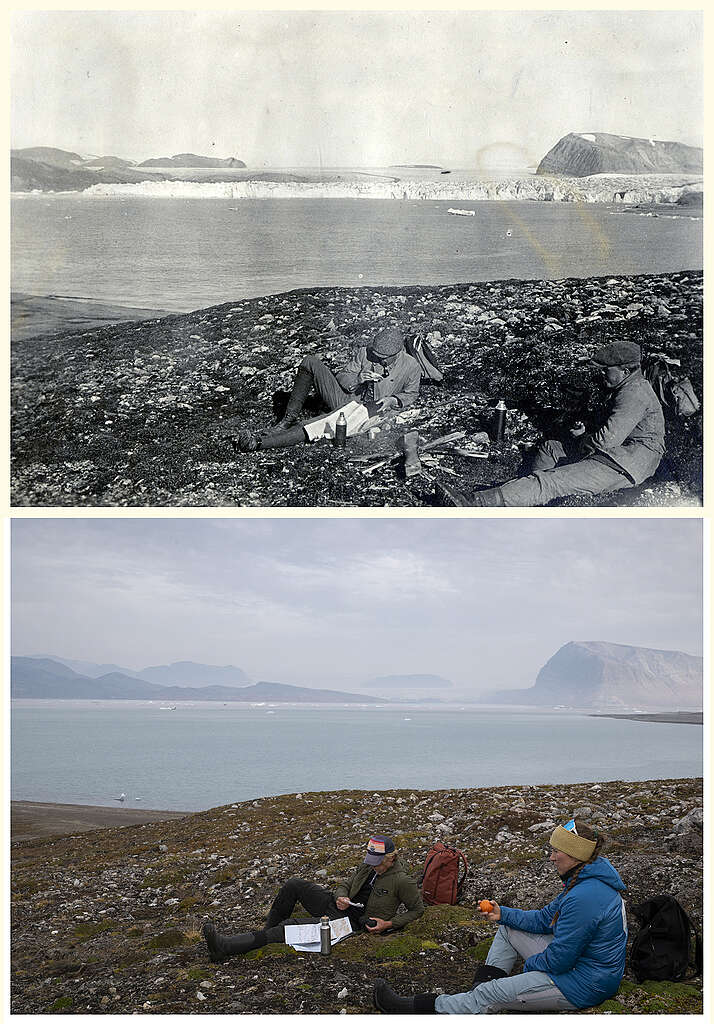
Doing the maths: Emissions and glaciers
Trying to visualise the damage
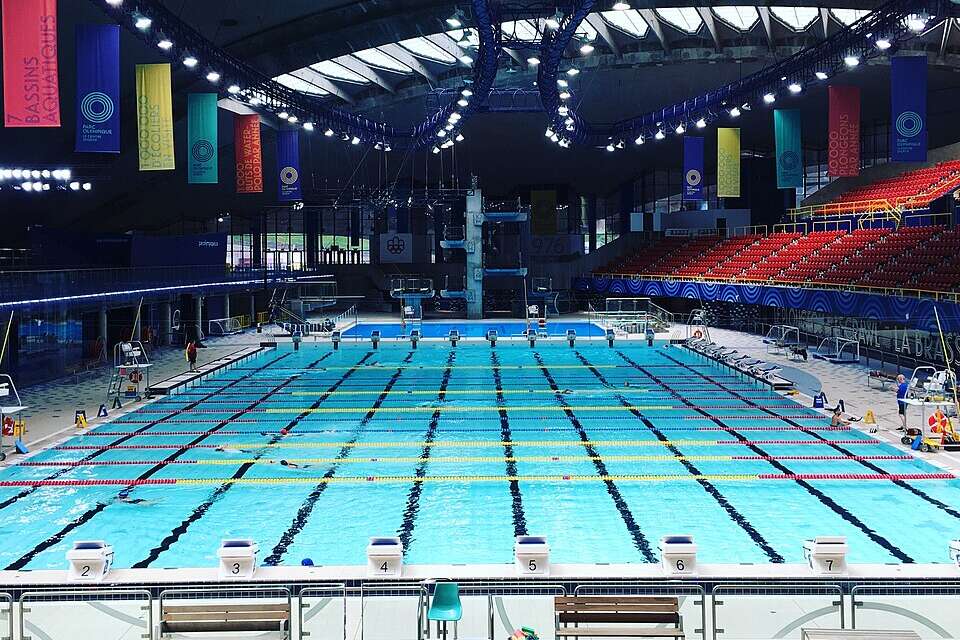
How you can help to hold oil and gas corporations accountable

Note: This article was edited on 3 January at 18.45 CET to clarify two figures related to glacier ice loss.Sources:
Greenpeace calls out oil and gas giant Eni’s Winter Olympics sponsorship
Greenpeace International
Milan, Italy – Greenpeace Italy has launched a hard-hitting video that highlights the absurdity of Italian oil and gas giant Eni’s sponsorships of the Milano Cortina Games, as one of the corporations stealing our winters through its planet-heating pollution. One year of Eni’s emissions could melt enough glacier ice to fill 2.5 million Olympic swimming pools, demonstrating the corporation’s central role in the climate crisis that threatens the future viability of the Games and winter sports.[1] Greenpeace Italy climate campaigner Federico Spadini said: “Fossil fuel driven climate change is putting the Winter Olympics and Paralympics at risk and the International Olympic Committee (IOC) cannot ignore this. The Olympic values of respect for people and the environment matter, that’s why Greenpeace is calling for the International Olympic Committee to drop oil and gas sponsorship from the Winter Olympic and Paralympic Games and commit to ending fossil fuel sponsorship across all Olympic Games.” The satirical Greenpeace Italy video, created by Studio Birthplace, shows speed skaters, skiers and bobsledders racing along, with Eni logos prominent. Suddenly a trickle of oil turns into a tsunami, sweeping the athletes off their feet, causing them to slip and crash as a sea of oil washes over them. The video lays bare the real impact of oil and gas on winter sports, including the Olympics, and warns of the risk of losing them forever without a rapid transition from fossil fuels to clean, renewable energy. More than half of the potential host cities Winter Games will be “climate-unreliable” by the 2080s, according to a rigorous 2024 scientific study funded by the IOC.[1] This is why Greenpeace is calling for the IOC to end fossil fuel sponsorship across the Winter Olympic and Paralympic Games and all Olympic Games through an open letter published today.[2] The IOC has previously used its unique position of global trust and influence to help combat industries that harm people, banning tobacco advertising ahead of the 1988 Winter Olympics in Calgary. Now it can help lead the shift away from fossil fuels by refusing sponsorship from fossil fuel corporations like Eni who are threatening the winters we all love with their emissions. To raise awareness of the call for the IOC to reject fossil fuel sponsorship of the Olympic Games, Greenpeace Italy will join a national march organised by civil society organisations in Milan on February 7th to protest the environmental, economic, and social impacts of the Games. ENDS Notes: [1] The climate crisis and the future of the Winter Olympics Eni is currently in a legal battle with Greenpeace Italy. In 2023, Greenpeace Netherlands released a study that applied the Mortality Cost of Carbon method, which projected that Eni’s self reported emissions for 2022 alone could cause 27,000 temperature-related excess deaths by the end of the century. Instead of changing their business, Eni attempted to silence these legitimate criticisms by suing Greenpeace Italy. Contacts: Martin Zavan, Communications Specialist, Greenpeace International, +61 424 295 422, mzavan@greenpeace.org Greenpeace International Press Desk: +31 (0)20 718 2470 (available 24 hours), pressdesk.int@greenpeace.org Texte intégral (611 mots)
Bon Pote
Actu-Environnement
Amis de la Terre
Aspas
Biodiversité-sous-nos-pieds
Bloom
Canopée
Décroissance (la)
Deep Green Resistance
Déroute des routes
Faîte et Racines
Fracas
F.N.E (AURA)
Greenpeace Fr
JNE
La Relève et la Peste
La Terre
Le Lierre
Le Sauvage
Low-Tech Mag.
Motus & Langue pendue
Mountain Wilderness
Negawatt
Observatoire de l'Anthropocène

 (@greenpeace)
(@greenpeace)